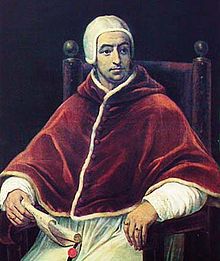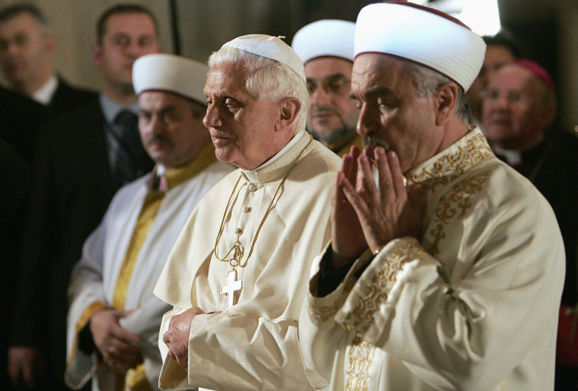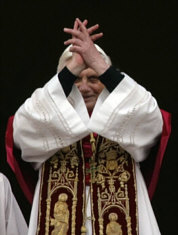Antipope Benedict X
Benedict X., actually John ( Mincius ), also known as Giovanni Mincio of Tusculum after its place of origin or John Mincius of Velletri after his diocese. This (* unknown; † 1073-1085 in Rome ) was a retrospectively classified as such antipope of 5 April 1058 to April 1060 for Its Latin name means the blessed one, his nickname before the pontificate but the stupid one. .
Origin
Benedict belonged to the family of the Counts of Tusculum, which played a joint determining role in the city of Roman politics in the 11th century. When his father is considered Count Guido of Tusculum, as his brother the multiple Pope Benedict IX. , Who on December 23, 1046 at a Synod of Bishops in Rome with significant line of King Henry III. had been deposed; the relationships are, however, controversial. John was bishop of Velletri, his place of origin of the nearest diocese, and was in 1050 by Pope Leo IX. elevated to cardinal.
Election of a pope and the papacy
A few days after the death of Pope Stephen IX. on March 29, 1058 John of Velletri was raised by opponents of the church reforms of the Roman aristocracy, to the Pope, with his family in the person of Gregory of Tusculum, Gerard of Galeria and Ottaviano Crescenzi carried out important assistance and agreed to the Roman people the choice because it said to have been prompted by financial inducements. His Pope names he chose in memory of his older brother (or relatives ) Benedict IX.
The now very strong reform movement under the first though absent Archdeacon Hildebrand, later Pope Gregory VII, had retired from Rome; their spiritual leader was the Cardinal Bishop of Ostia, Peter Damian, from whose hand a description of choice is narrated in a massive accusation of simony is charged. The general political circumstances after the death of Emperor Henry III. in October 1056 had contributed to the then uncertain situation of the papacy, because the government of the young Henry IV was completely unsettled. As Hildebrand still resided in the spring of 1058 on a mission trip to Germany, to Pope Stephen IX. have arranged that there should be no election of a pope without his presence after his death. Therefore, it was also an accusation of enemy Benedict X., to have violated this arrangement. After all, the Reform Party seems to have received IV and his mother Agnes at Pentecost in Augsburg whose consent to a new election Pope in the course of a meeting with Henry.
The reform-minded cardinals elected on December 6, 1058 the Bishop of Siena Florence, Gerhard of Burgundy, the new Pope Nicholas II. Benedict was deposed and excommunicated in January 1059 by that party at a synod in Sutri, although he personally a man of integrity should have been. He fled from Rome after his conquest on January 24 and initially sought refuge in the castle Passerano south of Tivoli, and then in the north of Rome, situated towns Galeria south of Lake Bracciano, where one of his aforementioned relatives sat.
Because Nicholas the support of the Margrave of Tuscany, Godfrey III. the Bearded, Duke of Lower Lorraine, and the Norman princes of Capua, Richard of Aversa, had secured, Benedict was finally captured. He was finally deposited on the Lateran Synod in April 1060 and his actions, which consisted largely in possession confirmations for various applicants were declared null and void, he should thereby also stripped in a formal method, the Pope robes and his priestly office have been regarded as having forfeited. Benedict died after 1073 and before 1085 in the monastery of S. Agnese fuori le mura in Rome. He was buried during the pontificate of Gregory VII there with papal honors.
Nicholas II issued an order on April 13, 1059 at a synod in the Lateran decree relating to the revision of the method of papal election, which is called the papal election decree. Thus, the excessive intervention of secular groups in the election process should a tie be advanced.
Afterlife
Although Benedict X was classified as anti-pope, in hindsight, he remained in the official counting of the Popes of his name as the tenth in force. His later successor from 1303 to 1304 is therefore. Than Benedict XI performed. This inconsistency gave rise to the since actually wrong counting of his successors: In the modern observance Benedict XVI was. provided with this ordinal, though he was, strictly speaking, only the fifteenth of his name Pope.









